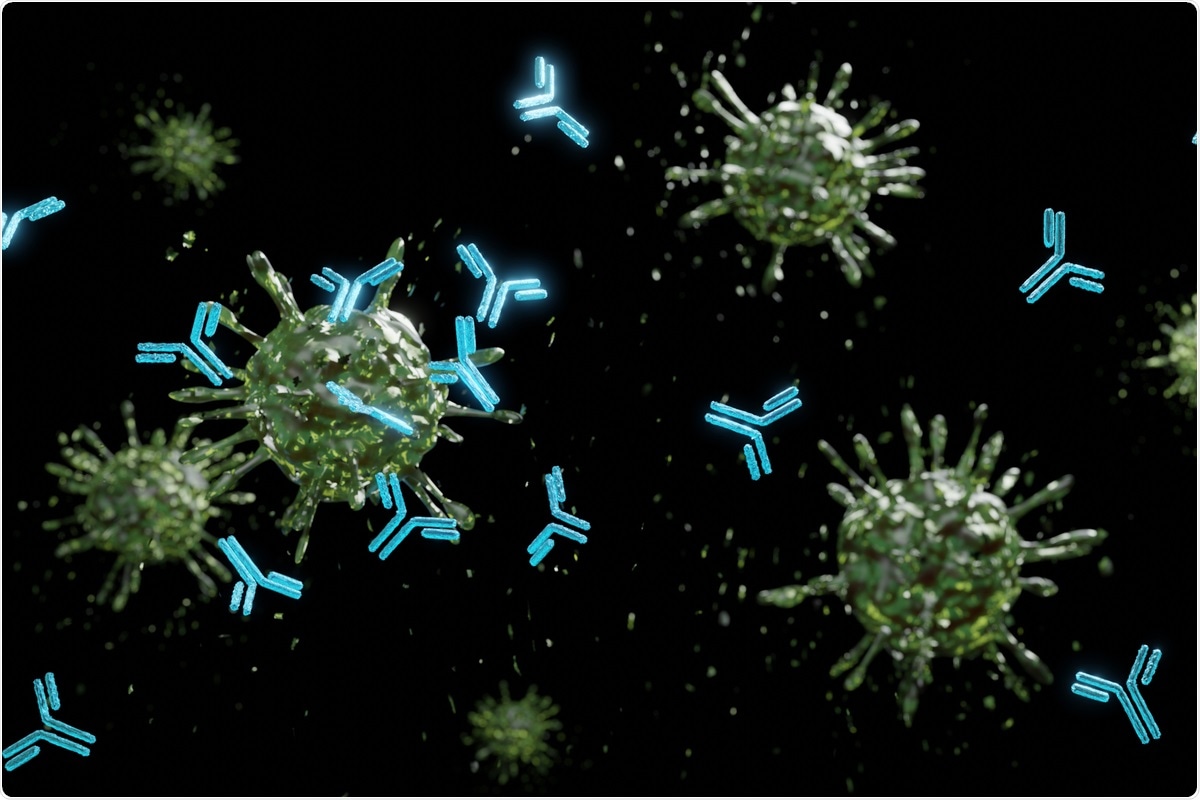Coronavirus disease 2019 (COVID-19) caused worldwide health and economic crises. While the development and mass administration of vaccines has successfully halted the progression of the disease in some countries, many are still struggling with the disease burden.
 Study: Clinical utility of Elecsys Anti-SARS-CoV-2 S assay in COVID-19 vaccination: An exploratory analysis of the mRNA-1273 phase 1 trial. Image Credit: LuXiFeR Bowlo/ Shutterstock
Study: Clinical utility of Elecsys Anti-SARS-CoV-2 S assay in COVID-19 vaccination: An exploratory analysis of the mRNA-1273 phase 1 trial. Image Credit: LuXiFeR Bowlo/ Shutterstock
The rise of variants of concern, such as the Delta variant that can evade both vaccine-induced and natural immunity, is a worry to all countries. The need for highly specific and sensitive assays that can quantify immune activity against COVID-19 infection is necessary for vaccine development, monitoring the effects of treatment, the levels of immunity in the population, and identifying the effectiveness of vaccines against new variants.
To this extent, researchers from Roche Diagnostics have been testing a new assay known as the Elecsys assay. A preprint version of the study is available on the medRxiv* server while the article undergoes peer review.
The study
Severe acute respiratory syndrome coronavirus 2 (SARS-CoV-2) contains four structural proteins, and the vast majority of immune responses target either the nucleocapsid (N) or spike (S) proteins. The spike protein is the target of most tests and vaccines, as it is key for the organism's pathogenicity.
The S1 subunit contains a receptor-binding domain (RBD) that binds to angiotensin-converting enzyme 2 (ACE2) to allow viral cell entry. The N-terminal of the S2 subunit is responsible for membrane fusion. IgM, IgG, and IgA can normally be detected two weeks after the onset of symptoms.
The Elecsys assay is an automated, high-throughput assay that focuses on antibodies against the RBD of the S protein. The scientists tested the assay by detected antibodies produced in individuals vaccinated against SARS-CoV-2 using the Moderna mRNA vaccine.
The researchers used samples from participants involved in the initial trials for the Moderna vaccine, including samples from healthy individuals between 18 and 55 years old who had received two doses of the vaccine 28 days apart at doses of either 25 or 100 ug.
To compare the antibody responses to those produced from previously convalescent individuals, samples from those confirmed infected with PCR tests were taken and analyzed using the Elecsys assay. These samples were all taken from individuals with both mild and severe courses of the disease. Samples were gathered from individuals in Switzerland, Germany, and Ukraine.
In total, 30 vaccinated individuals were examined, 15 who had received 25ug doses and 15 who had received 100ug doses. The Elecsys assay showed anti-RBD antibodies increase over time, and the antibodies were first detectable at day 15, suggesting seroconversion occurred some point before this.
Two individuals from the 25ug group did not show results at this time and did not develop significant antibody concentrations until day 29. The 100ug group showed a very similar anti-RBD response, with less spread between individuals.
Natively infected individuals developed a more heterogeneous antibody response – not unusual, given the immune system would have been exposed to multiple different proteins and not homogenous RBD proteins.
The Elecsys assay showed similar results to comparable assays, with statistical analysis showing a strong correlation between the tests. All positive results on the control assay received a positive result using the Elecsys assay, with a few samples showing a negative control result but a positive Elecsys result.
Conclusion
The authors highlight the benefit this new assay could bring in the fight against COVID-19. The assay successfully allowed the changes between dosage groups over time to be monitored and strongly correlated with the control assay.
The study showed seroconversion in all individuals who had received the vaccine after a short amount of time, that those who received the 100ug dose showed higher concentrations of anti-RBD antibodies compared to those who received the 25ug dose, and that the Moderna vaccine can produce higher levels of antibodies than seen in individuals who had become immune through infection.
*Important notice
medRxiv publishes preliminary scientific reports that are not peer-reviewed and, therefore, should not be regarded as conclusive, guide clinical practice/health-related behaviour, or treated as established information
- Jochum, S. et al., (2021) Clinical utility of Elecsys Anti-SARS-CoV-2 S assay in COVID-19 vaccination: An exploratory analysis of the mRNA-1273 phase 1 trial. medRxiv. doi: https://doi.org/10.1101/2021.10.04.21264521
Posted in: Medical Science News | Medical Research News | Disease/Infection News
Tags: ACE2, Angiotensin, Angiotensin-Converting Enzyme 2, Antibodies, Antibody, Assay, Cell, Coronavirus, Coronavirus Disease COVID-19, Diagnostics, Enzyme, Immune System, immunity, Membrane, Protein, Receptor, Respiratory, SARS, SARS-CoV-2, Severe Acute Respiratory, Severe Acute Respiratory Syndrome, Spike Protein, Syndrome, Vaccine

Written by
Sam Hancock
Sam completed his MSci in Genetics at the University of Nottingham in 2019, fuelled initially by an interest in genetic ageing. As part of his degree, he also investigated the role of rnh genes in originless replication in archaea.
Source: Read Full Article
